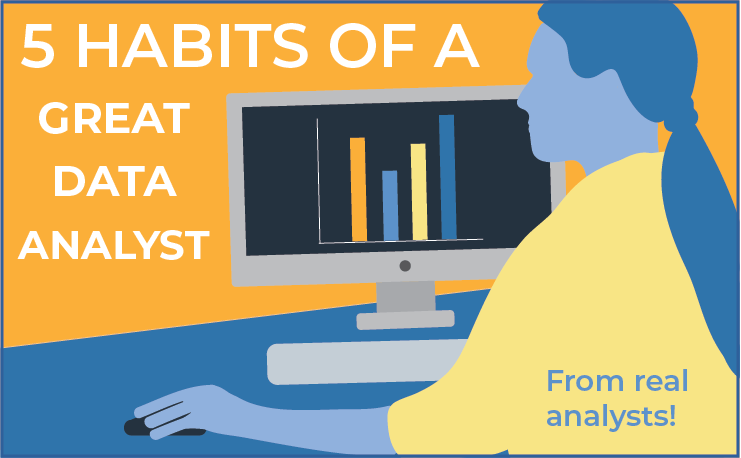5 Habits of a Great Data Analyst
by Hannah Barrett, on July 30, 2021

We asked our analysts what key, day-to-day habits they practice in order to be the successful data analysts they are...Here's what they said!
So what are the top 5 habits of a successful data analyst?
1. Take lots of notes, notes, notes!
A great data analyst makes sure to keep very thorough (and organized) notes. Keeping track of techniques or solutions discovered on one project will often help you in the future too.
Thorough notes help others understand your work and progress. With detailed notes, comments, and documentation it becomes easier to bring other teammates up to speed.
2. Ma'am, step away from the computer
If you're stumped on something, step away and then come back to it with fresh eyes. If you are having a tough time debugging code for example, this is a great way to help your brain reset. The answer may even come to you in your dreams!
Analysts often work independently, but it can be really helpful to make a habit of having others review your work and have conversations about it to make sure you aren't missing anything.
3. Always be learning
Make sure you understand the data you are working with. That means how it's structured and what it means from a business perspective.
Make sure you comprehend what the problem or question is before you begin working on it. Ask lots of questions during the requirements gathering stage.
If all else fails, it's time to start learning by doing. Jump in and get your hands dirty! Just make sure you're working in a development environment and not a production one if that is the case.
Learning a new technology? See what free online courses are available to teach you best practices. That way, you won't have to learn by trial and error on every little step of the journey.
4. You are not prepared... yet
Being well prepared for meetings is a great way to make sure all of your questions get answered. Meetings already interrupt your head space and daily routine enough, make sure to get the most out of every meeting.
After a meeting, write down any takeaways and action items for yourself so that you remember what the next steps are.
Preparation goes beyond meetings too. Prepare your work environment in a way that suits you best. When you sit down to work on a project, time will fly since you got everything in place to make the most of your efforts.
5. Manage your time and focus
Blocking out time on your calendar or agenda can help you manage more tasks than you expect.
Budget your time to ensure that you have designated periods of time for emails, meetings, developing reports, creating documentation, or some free time to address whatever else may come up during your day.
Break your day into smaller chunks where you can be heads-down and focused on the task at hand. If possible, turn off notifications to decrease distractions and switching costs.
If you would like to learn more about data analysis, or are in need of the assistance of some talented data analysts:




